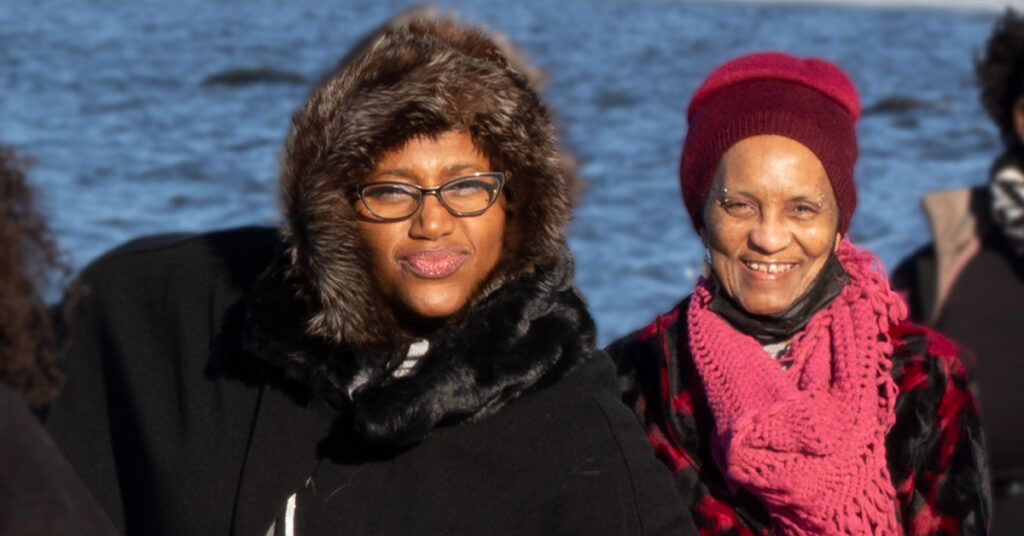
When I invited the group of women whose words fill the following pages to contribute to this issue, I gave them a quote from Dr. Anna Julia Cooper as a a prompt to think about while planning their stories.
Dr. Cooper said, “Only the BLACK WOMAN can say, ‘When and where I enter, in the quiet undisputed dignity of my womanhood, without violence and without suing or special patronage, then and there the whole Negro race enters with me.”
This statement made more than 100 years ago encapsulates how Black women’s power lands and then how we facilitate it.
I wanted to honor Dr. Cooper’s thesis by interviewing my friend and colleague S. Kai Cameron. She and I are co-directors of the Langston Hughes Community Poetry Reading, and she is a baaaad somebody with a story very similar to mine. We both attended Howard University and we have both had a long career in education. When she talks, I can hear my own voice.
April Brown: What did you think of the Anna Julia Cooper quote?
S. Kai Cameron: Hearing this quote for the first time, I responded within my head with the words, “We been there; we be there,” as a simple summary of how I/we walk in the world. And after reading excerpts of Dr. Cooper’s academic and professional life, I was amazed yet reassured that the Black women are powerful and infused with God-given strength and the dust of queens to achieve their goals and purpose, whatever that may be.
AB: Do you believe that the quote is accurate?
AKC: Absolutely! We — Black women — show up to the stage, to the meeting, to the rally, to the schools, as the spokesperson, the representative, the interpreter, the nurturer, the caregiver, the mother, the godmother – the keeper of the legacy. Perhaps we are the newest griot…?
AB: As a Black woman, do you feel like you have a particular responsibility to your community?
AKC: Yes. As a Black woman, I am often the only one in the room or at the table, a feeling many of the women in the following pages echo. Therefore, I always feel the weight of being the one who has to speak or at minimum represent the community in which I live and breathe. I think: If not me, then who? Yet in a number of my experiences and interactions, there are thoughtful and critical advocates for our community who speak out. But sadly, they are not listened to and therefore can’t bring about the benefits or even the support to sustain or enrich our community.
AB: How did you become an educator and then how did that experience and practice cultivate your community engagement?
SKC: My initial experience in community was teaching children in Washington, DC, at the Banneker Community Center where I worked with a tutoring program as a student at Howard University.
Then, as part of my practicum for receiving a degree in early childhood education from Rhode Island College, I taught kindergarten at the William E. Flynn Elementary school, a neighborhood school located in South Providence. After being hired by the Providence school department as a long-term substitute teacher, I worked at several city schools — Windmill Street Elementary School, Camden Avenue School — however, in the early ’80s, my teaching life pivoted to my lifetime path of intersecting education with community.
At a request from a Black public school administrator, Mel Clanton, I was asked to direct an “at-risk” program (at the now-defunct Opportunities for Industrialization Center (OIC) for middle-school aged students banned from public schools). The program operated for almost five years. The next five years I spent as the supervisor for the education department at the Urban League of Rhode Island (UL). At the two major community-based Black organizations of their time, I was able to hone my skills and expand my expertise not only as an educator, but as an advocate for children and their families in the Black community — undisputedly ‘my calling’.
In the early ’90s, prior to gaining a master’s degree from URI in Community Planning/Social Policy, I was appointed by the City of Providence as the project coordinator to operate a city-wide, federally funded five-year substance abuse prevention project in 25 neighborhoods. Not surprisingly, this project was complex and challenging, but truly I was able to further expand my community-organizing skills and deepen my love for Community.
True to the ‘Circles of Life’ motif, in 2000, I was called to the Providence School Department to step-in as the Interim Student Relations Officer, which required much of my work to deal directly with students, their families and their position in our community. This work, and what followed in later years, established me in a system where I was consistently challenged, but always reassured that the relationship of education experience/practice to cultivate community engagement/involvement is indisputable. And this holds true for the work that we continue to do with the Langston Hughes Community Poetry Reading.
AB: Why did you feel it was necessary to participate in the community the way that you did?
AKC: Whether on a national stage or in a local environment, I always took the opportunity to visualize (through my style of dressing and adornments) and to articulate those actions and nuances that are particular to our community and culture. I frequently find myself interpreting or translating for the system, the ways and the whys of how children and adults perceive their world and their appropriate reactions to the challenges that often seem in direct opposition to so-called community norms. And as an individual, I am driven and proud to represent my community, but deeper still, I feel that my responsibility to the community of Black people (and in recent terms — BIPOC people) emanates from my Ancestors, the People of the Nile. In the words of Langston Hughes from “The Negro Speaks of Rivers,” “My soul has grown deep like the rivers.” Truly.

